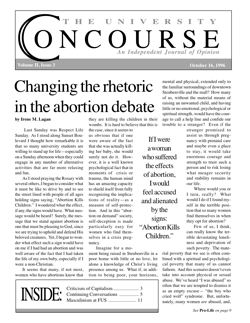Scholarship at Franciscan University
by Mary McElwee
Just a few words on scholarship and athletics at the university.
In my view, Joanna Bratten’s attack on sports as virtually idolatrous was harsher than necessary—particularly at a university where athletics do not pose a serious threat to the academic welfare of the vast majority of students. Still, the failure of those who criticized her position to seriously address the issue of what a university should be in this area (i.e., the area of tension between athletics and academics) brings me to a position of defending Ms. Bratten to a limited extent. Even if sports do not seriously threaten studies here, certainly something does.
So far in this discussion, neither side has addressed without personal bias the question of what role athletics should play at a university. Ms. Bratten writes with a bias against athletics because of one particularly unpleasant incident, in which she was personally involved. Those who respond to her article write in defense of a sort of pet interest or favorite pastime that they prefer not be criticized. But the key question still stands: What role do athletics play in the ideal university? As both Maria Ellis and Ivan Ortiz state or imply in their responses of Vol. II, issue 2, and as Ms. Bratten concedes in her article, sports do without doubt have a legitimate place in a university setting. But this is not to say that the current role which athletics play in the life of the average student at the Franciscan University is perfectly unproblematic.
One would hope that a student enrolled in the Honors Program would actually want to attend the Symposium, which stands as a sort of celebration of the year’s advancement in scholarship. Whether it is required is beside the point; it shouldn’t have to be. If scholarship at the University were what it should be, students in the Honors Program would simply attend, even if they didn’t want to. They would feel it part of their duty or role as Honors students. To say, as Mr. Ortiz does, that the Honors Symposium is merely another “extracurricular activity…[which] should take no higher importance than any other extracurricular activity, such as intramural sports,” is to completely overturn the ideal of the university, which is primarily an academic setting by definition. Ultimately, I would say, even an academic lecture should take precedence over an athletic competition; students should arrange their athletic schedules around their academic schedules and not vice versa. And the amount of time put into academics should by a large margin surpass the amount of time put into athletics or any other extra-curricular activity, and even all such activities added together. Otherwise, what makes a student a student?
As to the values gained through intramural sports (e.g., teamwork and respectful competition) which Ms. Ellis cites: these are important, but they should all be already well-ingrained in us; we are, after all, adults.
And thus the simple fact remains: sports are fun, and recreation is an important and healthy way to maintain that “tripartite composition of mind, body and soul” of which Mr. Ortiz speaks. But the fact also remains that sports are, in the end, “just games”; and the university is primarily an academic setting. Even the student attending college only through the aid of a football scholarship will, if he seriously wishes to study, place primary emphasis on his academic activities rather than athletic. And this is how the university should be.
Before I close, I would like to affirm that I do not find sports to be the “most insidious” threat to academics at Franciscan University. There are serious problems in various other areas and programs, which tend to distract the student from his studies even more than intramural sports do. For example, many students will actually forego the pleasure and duty of competing with their teams in intramural competitions when their studies very obviously demand their time and attention. But how many are equally willing to forego the pleasure or duty of going on a household or other university-sponsored retreat, or even to a household or other meeting?
I do not say that no student should ever go on retreat; I myself would not have survived my four years without such spiritual vacations. Neither do I make the sweeping generalization that no student should be involved in clubs, households or other organizations; nor that he should feel free to skip all the meetings. But the many long Saturday hours I spent virtually alone in the library during my undergrad years here proved to me that the average student does not suffer from an over-heavy burden of academics. The problem is more general than simply a tension between academic and athletics; it is a problem of tension between academics and many, many things. And, from my experience of four years here in Steubenville, I would say that all too often the academics lose.
Mary McElwee, Class of ‘96
Mary McElwee is currently working as a lecturer in the classics department at FUS. She is one of two Concourse copy editors (who bear no responsibility for typos in the editorials, which have so far been completed too late to benefit from their able scrutiny).


